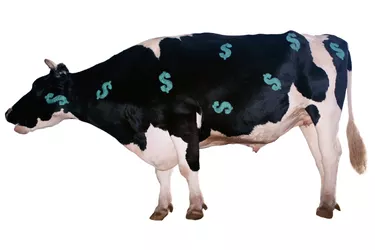
If you're a cattle rancher or are thinking of becoming a cattle rancher, the Internal Revenue Service provides encouraging tax incentives for your business. As of 2011, cattle and certain expenses related to raising cattle for profit are valid tax deductions. It's important to also be aware of certain cattle-related circumstances that are not valid tax deductions.
Cattle Purchased for Resale
Video of the Day
If you purchase cattle with the intent to resell them, you're eligible to deduct both the cost of the cattle themselves and of transporting the cattle. However, you can't deduct these costs in the year you buy them, unless it's also the year you sell them. According to the IRS, all deductions must be made during the year they're sold.
Video of the Day
Capital Expenses
Any cattle you purchase for purposes of dairy, breeding, sport and drafting are considered to be capital expenses by the IRS. That means that you're eligible to depreciate the cost of cattle that live on your farm or ranch and aid you in turning a profit over their lifetimes. Since cattle are expected to live longer than a single year, they qualify as capital expenses. Also, any expenses incurred in initial acquisition and upkeep of such cattle on your property are deductible. This includes the cost of labor you hire, structures to house the cattle and feed.
Things You Cannot Deduct
A head of cattle you raise for personal use in activities that don't generate a profit, such as a dairy cow that provides only your family with milk, isn't deductible. Associated expenses to do with that head of cattle are likewise not deductible. The IRS considers such cattle to be for personal use, not business use.
Considerations
Be sure to consult a qualified tax professional who is proficient and knowledgeable in handling livestock-related taxes and deductions. Also, keep all receipts and documentation you acquire in the day-to-day operations of running your cattle-related business. If the IRS audits you, you'll need to furnish adequate evidence to support any and all deductions that you take -- cattle-related or otherwise. Since the lucrative tax deductions associated with cattle have resulted in its promotion as a legal tax shelter, it is especially important for you to protect your business investment should an audit arise.